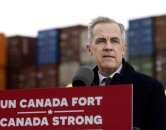Source Feed: National Post
Author: John Ivison
Publication Date: April 10, 2025 - 06:00
John Ivison: Carney’s rosy energy promises meet the Liberals’ dismal record
April 10, 2025
I’m reading my six-year-old son Lewis Carroll’s classic Through the Looking-Glass and What Alice Found There, with all its delightful nonsense talk about shoes and ships and sealing wax, of cabbages and kings.
But, in the words of the Red Queen, life through the looking glass is “as sensible as a dictionary” when ranked against what is happening in the real world.
President Donald Trump’s trade war has sparked a stock market sell-off and a rise in Treasury yields. As The Economist
pointed out
: “This should not be happening” (yields normally fall when share prices rise, as investors flee to the safety of American government debt). We are in the bizarre position of seeing Greek 30-year bonds rated as a safer investment than their U.S. equivalents.
There is also an air of the surreal around the Canadian general election, with the Lazarus-like resurrection of the Liberals.
The Conservatives just can’t catch a break, to the point where a
new Ipsos poll
claims the Liberals even have an advantage when it comes to support for their energy policies. Ipsos asked which party and leader would do the best job managing Canada’s energy and resource industries, in terms of creating jobs and growing the economy.
If there is any area of policy that should be an Achilles heel for Liberal Leader Mark Carney it is this. Yet he outpolled Conservative Leader Pierre Poilievre on the question of who would be better to “to balance both economic opportunities and environmental concerns” in developing energy resources.
Carney was in Calgary in his home province on Wednesday trying to salve wounds that have festered over a decade during which Albertans viewed Liberal policies as a sustained assault on their interests. In one of his rare visits to the province in fall 2018, Justin Trudeau’s hotel was besieged by angry Calgarians and he was booed at an event for his role in killing pipelines and instituting a tanker ban off the West Coast.
Carney tried to make nice, thanking Alberta’s energy workers “on behalf of a grateful nation. You are an integral part of Team Canada and you make Canada strong.”
But many Westerners will remain skeptical, remembering another Trudeau visit to the province — this one in late 2012 — when he said he was there “to confront the ghosts associated with my father,” namely the hated National Energy Program. The younger Trudeau said the resource industry helped define Canada’s success and that “no country in the world would find 170-billion barrels of oil in the ground and leave it there.”
But the reason the Liberals only have two MPs in the province is because many Albertans believe that’s exactly what Trudeau tried to do during his time in office.
Carney has made conciliatory noises but has been less than precise about his plans to develop Canada’s resources since becoming prime minister, and he continued that tendency on Wednesday.
We remain none the wiser on the
consultations around an emissions cap that he referred to
, or on the new “integrated”
industrial carbon credit market
that he has talked about obliquely.
What he did say was that his government, if elected, would issue regulatory decisions after two years, instead of five, through a “one project, one review” process.
He said Canada can’t lose sight of its response to climate change or long-term competitiveness in the energy sector. And that it means working closely with the industry to reduce emissions through carbon capture and storage projects.
But he said regulatory substitution is possible, where provinces, territories or Indigenous groups lead project assessments.
Carney said scrapping the Impact Assessment Act — previously Bill C-69 — doesn’t make sense. “Rather than stopping projects in their tracks and throwing out the whole act, (then) starting from scratch and spending the next decade in court,” he said Ottawa would sign co-operation agreements with the provinces and others to rely on their assessments.
The Liberal leader was asked directly whether he is committed to doing everything in his power to build new oil and gas pipelines and new LNG projects.
He did not answer in the affirmative, but said he has put in place a tangible process that identifies projects deemed to be in the national interest; that builds energy corridors; that puts in place a “one project, one review” approval system; and that allows for provinces to sign on to regulatory-substitution agreements, as British Columbia has already done.
“We are going to move forward as a country when we come together: federal, provincial, industry, labour and First Nations. I think we have the ability as a Liberal government to bring together all Canadians and get things done,” he said.
Stirring words but anyone with experience in the energy industry knows not to mistake motion for action.
The tone is positive, but the Liberal government has been promising permitting reform and the implementation of one project, one assessment for at least a year.
As Carney noted, British Columbia has already signed up for substitution agreements because the Impact Assessment Act already allows for this prospect. Even then, the federal government
took months to make their own decision
to approve the Tilbury Marine Jetty LNG project on the Fraser River in Delta, B.C.
There is no guarantee that Alberta would even sign such an agreement, given the Supreme Court of Canada has ruled that provinces do not need federal recognition to assert their jurisdiction over natural resources.
What Carney does have right is the need for a sense of urgency.
In the midst of what he called “the biggest crisis in our lifetime,” Canada’s regulators appear to be living in a world of cabbages and kings.
Heather Exner-Pirot, a senior fellow at the Macdonald-Laurier Institute, pointed to the NexGen Energy Rook uranium mine in northwestern Saskatchewan, which has provincial environmental approval, Indigenous consent, capital, and demand in place. It is, in the parlance, “shovel-ready,” but requires the green light from the Canadian Nuclear Safety Commission. CNSC staff have completed their review of the environmental impact statement and have
now scheduled public hearings for … November 19th
.
Carney talks of doing things at speeds we didn’t think possible. This is the epitome of the political will meeting the administrative won’t.
National Post
jivison@criffel.ca
Get more deep-dive National Post political coverage and analysis in your inbox with the Political Hack newsletter, where Ottawa bureau chief Stuart Thomson and political analyst Tasha Kheiriddin get at what’s really going on behind the scenes on Parliament Hill every Wednesday and Friday, exclusively for subscribers.
Sign up here
.
The Liberal Party is promising to leverage artificial intelligence (AI) and merge similar programs and services to make the public service more efficient. Read More
April 19, 2025 - 14:45 | Paula Tran | Ottawa Citizen
WHITBY, ONT. — On
this week’s Ivison video
, regular guest Eugene Lang referred to “the trifecta — or what Van Morrison
would call The Great Deception.”
Lang, an experienced Liberal operative, was talking about the tendency of governments...
April 19, 2025 - 12:57 | John Ivison | National Post
With just over a week left in the campaign, the Liberals and NDP released costed platforms Saturday, as Mark Carney pledged billions in new spending to boost investment.
April 19, 2025 - 12:54 | Globalnews Digital | Global News - Canada




Comments
Be the first to comment